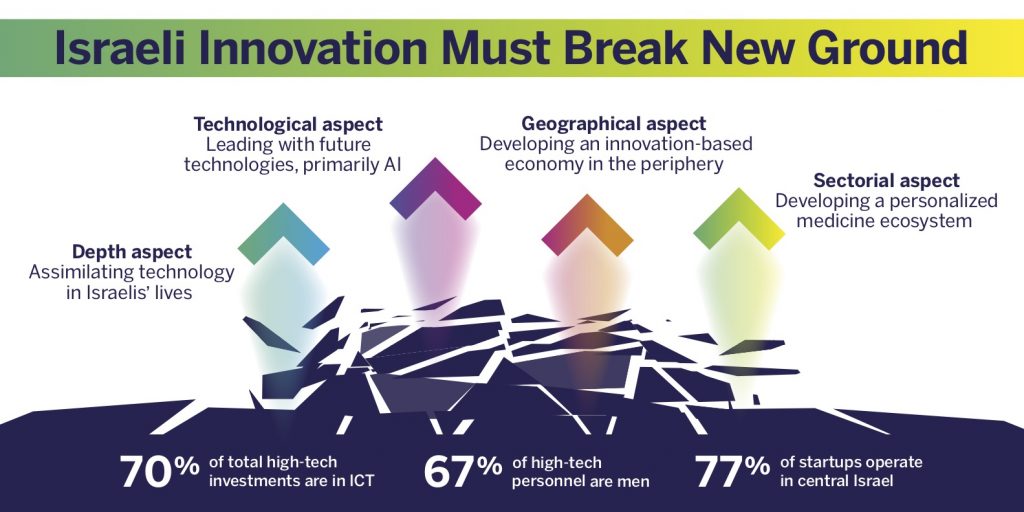Israeli innovation has attained great heights in recent decades. Israel is a global center with a vibrant innovation culture based on interdisciplinary capabilities, a spirit of entrepreneurship and strong technical skills. Recent years have witnessed a flourishing of Israeli hi-tech that is expressed by widespread activity of multinational corporations, innovative startup companies, and Israeli growth companies.
The “High Tech in Israel 2018” Chapter of this report will describe yet another year of impressive achievements for Israeli innovation. This has been attained despite the challenging period in which the world order has destabilized, following world trade wars and tax reforms instituted by the Trump government. It is especially worth noting the breakthrough of sectors such as Fintech and artificial intelligence (AI) alongside the maturing of growth companies in the “traditional” fields of internet, cyber, medical devices etc.
However, if Israel wants to make the transition from a startup nation to a smart-up nation, the Israeli innovation ecosystem must break through the boundaries within which it presently operates.
Israeli innovation is defined by several dimensions. Technologically, the majority of the innovation activity is focused in the ICT sector. From a geographical perspective, the dominant mass of activity is still concentrated in central Israel, with only relatively low activity even in major cities like Haifa, Jerusalem, and Beersheba. From a demographic perspective, approximately half of all high-tech employees are up to 45-year-old non-Haredi Jewish men.1CBS data – Labor Force Survey, 2017 Moreover, technological innovation has yet to breach the bounds of the high- tech industry. As a result, the overwhelming majority of Israeli citizens do not feel that they live in a “technological” country in areas that affect their daily lives such as transportation, commerce, finance, and access to public services. The upshot is that the huge economic and social potential inherent in Israeli innovation remains largely unfulfilled.
Our perception is that innovation is a key engine for economic growth and wellbeing. As such, all citizens, sectors, regions and spheres of life in Israel should benefit from it. A central theme in our State of Innovation in Israel report for 2017 was increasing the number of employees in innovation-based firms. In the current report, we present a vision of the Israeli innovation breaking boundaries in several additional dimensions.
In the “Technology Power Race” Chapter, we will discuss the challenge of the technological dimension – the competition on leadership in the technologies of the future. This is especially relevant when set against the background of intensifying global competition in emerging technologies, primarily in artificial intelligence.
In the “Personalized Medicine” Chapter, we will present the challenge in the sectorial dimension – how to breach the bounds of ICT and develop a leading personalized medicine ecosystem in Israel. Israeli industry enjoys significant advantages in areas of unique medical data: It is based on the health funds’ computerized medical files, on genomic databases, on sophisticated basic science, and on the proven capability of the Israeli ecosystem in ICT, all of which place Israeli industry at an excellent starting point.In the “Innovation-Driven Economy in the Periphery” Chapter, we will present the challenge of the geographical dimension – breaching the borders of innovation activity that is currently located primarily in central Israel and bringing it to the rest of the country. We will propose a practical strategy based on bolstering high-tech in the metropolises, improving utilization of the human capital potential in the periphery and strengthening the regional advantages via technological innovation.
Finally, in the “From a High Tech Industry to a Smart Economy” Chapter, we will present the “depth” dimension of the challenge – how to cause Israeli technological developments to become an integral part of daily life in Israeli society. We will propose possible directions for closing the gap between Israel and the leading Western nations that increased the level of their populations’ accessibility to advanced technologies in all areas of daily life.

Breaking through the boundaries of Israeli innovation is a multi-layered national mission. In order to become a leader in the technologies of the future, Israel needs to invest in research infrastructures, in human capital in academia, and in industrial R&D. Development of an innovation-driven economy in the periphery requires determined action, both on local and national levels; coordination between all government health and innovation entities is needed in order to develop a personally-tailored healthcare ecosystem; support from regulators in different sectors is necessary to implement Israeli technological developments in the local economy.
The Innovation Authority is therefore cooperating with a range of government departments in order to promote these goals. In so doing, we have asked our government partners to contribute to this report and present their proposed solutions and detailed suggestions for contending with the relevant challenges and objectives.
The report features short vision-focused articles written for us by the Ministry of Health, the Ministry of Education, the Council for Higher Education’s Planning and Budgeting Committee (PBC), the Ministry of Transport, the Ministry of Energy, the Ministry for environmental protection, the Ministry of Economy and Industry, the Ministry of Agriculture and the Ministry of Finance together with the Ministry of Justice.
In summary, in this report we seek to promote the transformation of Israel from a startup nation to a smart nation, a move that will benefit the Israeli economy and enhance the welfare of its citizens. Global technological, economic, and social trends are today converging to create a window of opportunity, one the Innovation Authority will strive determinedly to seize for the benefit of the State of Israel.
